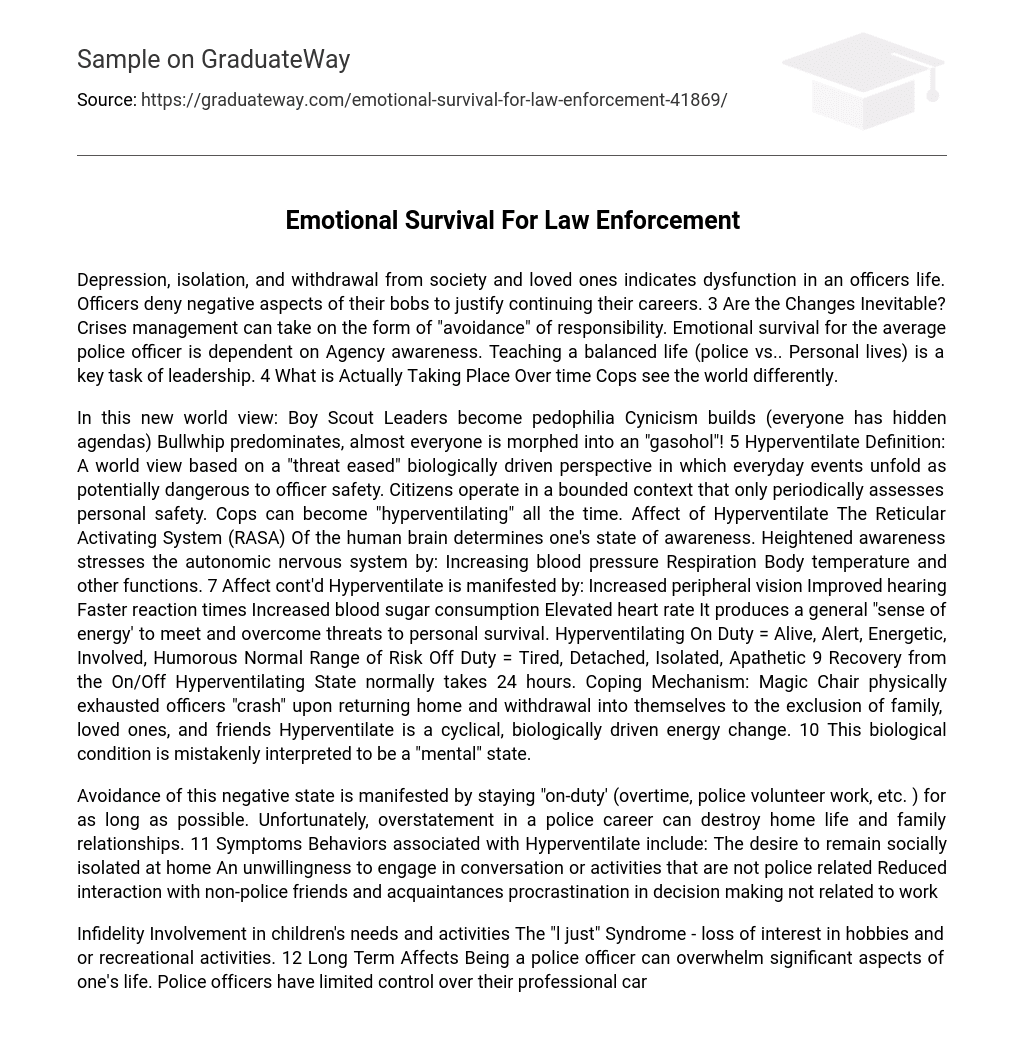Depression, isolation, and withdrawal from society and loved ones indicates dysfunction in an officers life. Officers deny negative aspects of their bobs to justify continuing their careers. 3 Are the Changes Inevitable? Crises management can take on the form of “avoidance” of responsibility. Emotional survival for the average police officer is dependent on Agency awareness. Teaching a balanced life (police vs.. Personal lives) is a key task of leadership. 4 What is Actually Taking Place Over time Cops see the world differently.
In this new world view: Boy Scout Leaders become pedophilia Cynicism builds (everyone has hidden agendas) Bullwhip predominates, almost everyone is morphed into an “gasohol”! 5 Hyperventilate Definition: A world view based on a “threat eased” biologically driven perspective in which everyday events unfold as potentially dangerous to officer safety. Citizens operate in a bounded context that only periodically assesses personal safety. Cops can become “hyperventilating” all the time. Affect of Hyperventilate The Reticular Activating System (RASA) Of the human brain determines one’s state of awareness. Heightened awareness stresses the autonomic nervous system by: Increasing blood pressure Respiration Body temperature and other functions. 7 Affect cont’d Hyperventilate is manifested by: Increased peripheral vision Improved hearing Faster reaction times Increased blood sugar consumption Elevated heart rate It produces a general “sense of energy’ to meet and overcome threats to personal survival. Hyperventilating On Duty = Alive, Alert, Energetic, Involved, Humorous Normal Range of Risk Off Duty = Tired, Detached, Isolated, Apathetic 9 Recovery from the On/Off Hyperventilating State normally takes 24 hours. Coping Mechanism: Magic Chair physically exhausted officers “crash” upon returning home and withdrawal into themselves to the exclusion of family, loved ones, and friends Hyperventilate is a cyclical, biologically driven energy change. 10 This biological condition is mistakenly interpreted to be a “mental” state.
Avoidance of this negative state is manifested by staying “on-duty’ (overtime, police volunteer work, etc. ) for as long as possible. Unfortunately, overstatement in a police career can destroy home life and family relationships. 11 Symptoms Behaviors associated with Hyperventilate include: The desire to remain socially isolated at home An unwillingness to engage in conversation or activities that are not police related Reduced interaction with non-police friends and acquaintances procrastination in decision making not related to work
Infidelity Involvement in children’s needs and activities The “l just” Syndrome – loss of interest in hobbies and or recreational activities. 12 Long Term Affects Being a police officer can overwhelm significant aspects of one’s life. Police officers have limited control over their professional career. Bosses, external stakeholders, politicians, laws, regulations, etc. Diminish perception of control The more one feels “out-of-control” the greater the chance officers sees themselves as victims Limited control also can lead one to acquire an entitlement mindset that is justified by a feeling Of Ewing “screwed” by the powers-that-be. 3 Factorization “Victims” exhibit the following behaviors: Merged professional and personal roles Hypersensitivity to change Rigidity and inflexibility Ever present feeling of being threatened and for persecuted Need to retaliate against the power structure Social isolation from fellow workers (except a chosen few “believers”) Grandiose sense of Self Importance Exaggerated perception of past accomplishments Internalized sense of entitlement. 14 Values in Conflict Core “Guardian/Protector’ values of duty, honor, etc. Are challenged when one becomes a helpless victim.





